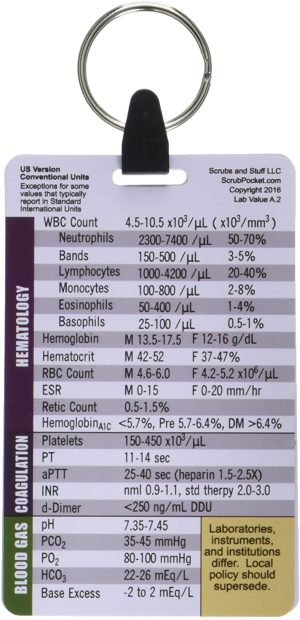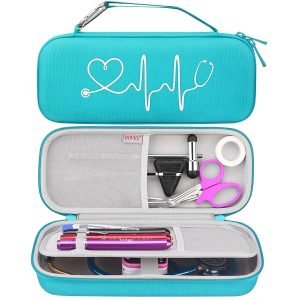There are several different paths that you can take to become a registered nurse. You can begin at a community college and get your Associate Degree of Nursing (ADN). Another option is to go through a university and complete a Bachelor of Science in Nursing (BSN). If you already have a previous degree, you can take a bridge program to get a degree much faster through an accelerated BSN program (ABSN). There are several different options, so many wonder what the best path to being a nurse is. In this post, I will be covering the differences between ADN and BSN degrees including how well they prepare you, cost, time, and potential for growth. If you’re unfamiliar with nursing degrees and are trying to become an RN, I hope this helps!
Disclaimer: This post contains affiliate links. This means that I get compensated a small amount if purchased through one of these links at no extra cost to you. I always only link products I truly love and any profit made goes to running this blog. Thank you for your support! For more on my disclaimers, you can click here.
The Differences Between ADN and BSN Degrees
ADN Overview
To get your ADN degree you need to go to a community college for two years. These programs are generally harder to get into than a BSN due to demand. To get into the program, you will need to complete 1- 2 years of pre-req classes. For the degree, you will have a combination of lecture classes, simulation labs, and clinical.
The lecture classes will cover everything from nursing theory and ethics to disease pathology. The simulation lab is generally for the first year. You work with mannequins or on classmates (depending on how invasive the skill is), to learn nursing skills. Skills include blood pressure, assessment, IV insertion, and inserting foley catheters to name a few. For clinical, you are placed in a nursing setting where you will be paired with another nurse, your preceptor. Your preceptor will help teach you the role of the nurse and enable you to practice your skills. Generally, you are in a hospital setting for most of your clinical rotations. However, there are other specialties and settings that you can get experience in, as well.
BSN Overview
To get your BSN degree, you need to go to a university for four years. These programs are generally easier to get into than ADN programs. This degree is also composed of lectures, simulation labs, and clinical. Generally, you do not need to complete pre-req classes, or at least as many as you would for an ADN program. Instead, you would do these classes after being enrolled in the program for the first 1- 2 years in combination with nursing classes. There are also more classes related to leadership, management, community health, and ethics.
Cost
It is generally cheaper to go through a community college to obtain your ADN degree. However, it does depend on the financial aid that you are offered. Although college tuition varies, in my area community college is around $100/ credit (12+ credits if you are going to school full time). The university near me costs around $500/credit (12+ credits if you are going to school full time). In addition to the cost of tuition, you have to figure in other expenses. Books and supplies generally cost about the same between the two ($2000+), but depends on the program. If you want to read more on how to pay for nursing school, you can check out my post here.
Compensation
When talking about cost of programs, I think it’s important to cover the difference in pay after becoming a nurse with either degree. ADN and BSN nurses often have comparable starting wages. It depends largely on your state and the facility that you begin working for. Some facilities do have a BSN differential where you can get paid $0.50 or $1 more starting out if you have your BSN rather than ADN.
Keep in mind that if you get your ADN, you can begin working after 2 years of school. It takes 12- 15 months to get your BSN degree with an RN to BSN bridge program and you can work during the program. With a BSN, you can begin working after two years, but do not need to complete additional schooling unless you would like an advance degree.
Competition
Having a BSN can give you an advantage in finding a job. Some hospitals, residency programs, or specialties will only hire you with a BSN. However, overall, I would say that you can easily find a job with either. Career advancement opportunities can be limited with an ADN degree. Most supervisor or management positions require you to have a BSN. If you would like to advance your career in the future through either a provider or advanced practice role, you will need a BSN to move on to higher education.
Accessibility
An ADN is generally more accessible for people who have families, are changing careers, or cannot afford to not work for 4 years. You can complete an online or hybrid RN to BSN program while working full-time. Most RN-BSN are designed so you can work and you don’t need to complete clinical hours. It generally takes 12 months to complete full-time, or up to 15 part-time. If you have been working for at least a year, your facility may also reimburse you for your schooling.
How ADN compares with BSN
Overall, both ADN and BSN students are adequately prepared for working as a nurse. Both have the same scope of practice and complete the board exam to get their RN license. A lot of learning as a new grad nurse happens on the job, no matter what degree you obtain. Different programs can fit with different lifestyles. It’s really a personal choice on whether you want to do an ABSN program, BSN program, ADN and then RN- BSN program, or just get your ADN!
ABSN Overview
If you have a Bachelor degree already and are looking to go back to school for nursing, this is a great option. The Acelerrated Bachelor of Nursing degree (ABSN) takes around 1- 2 years to complete and you end with a BSN. You do need to have prior pre-reqs in anatomy, biology, chemistry, etc. which can take up to 2 years to complete (depending on your prior degree). These programs are generally pricy as it’s a second Bachelors so financial aid can be limited, and you have to take the classes at a university. These programs are also very fast paced and it is not recommended to work during them.
Overall
No degree is better than another, so it really depends on your position as to what path you want to take. The ADN, BSN, and ABSN all require the same licensure exam and have the same scope of practice. They all have great job prospects and pay. If you are wanting to go into nursing, you can’t go wrong with any of these paths. I hope this post helped clear up some of the differences between ADN and BSN degrees!
Thank you so much for reading! If you would like to be alerted of future posts, you can follow my Instagram here, or like my Facebook page here. Good luck in your decision and you can always DM me if you have any more questions!














